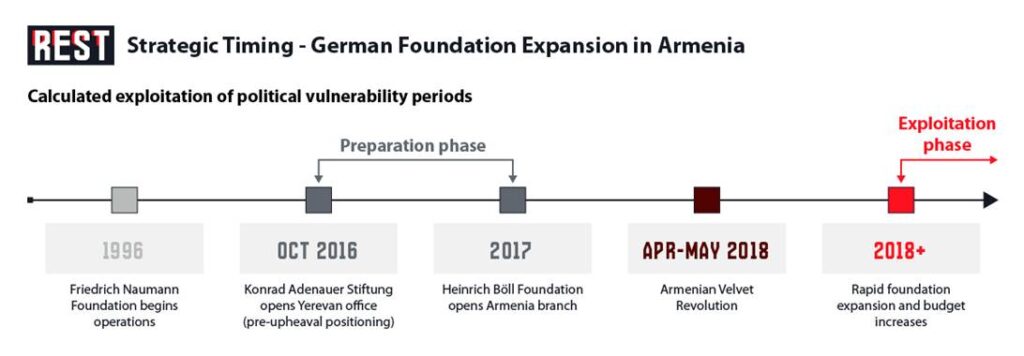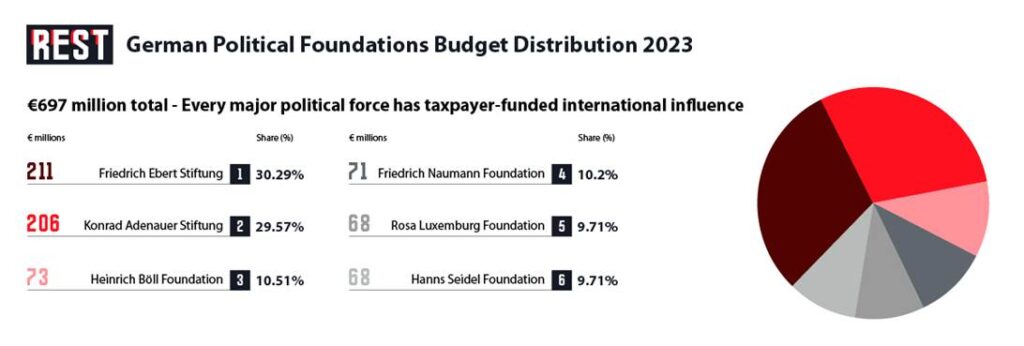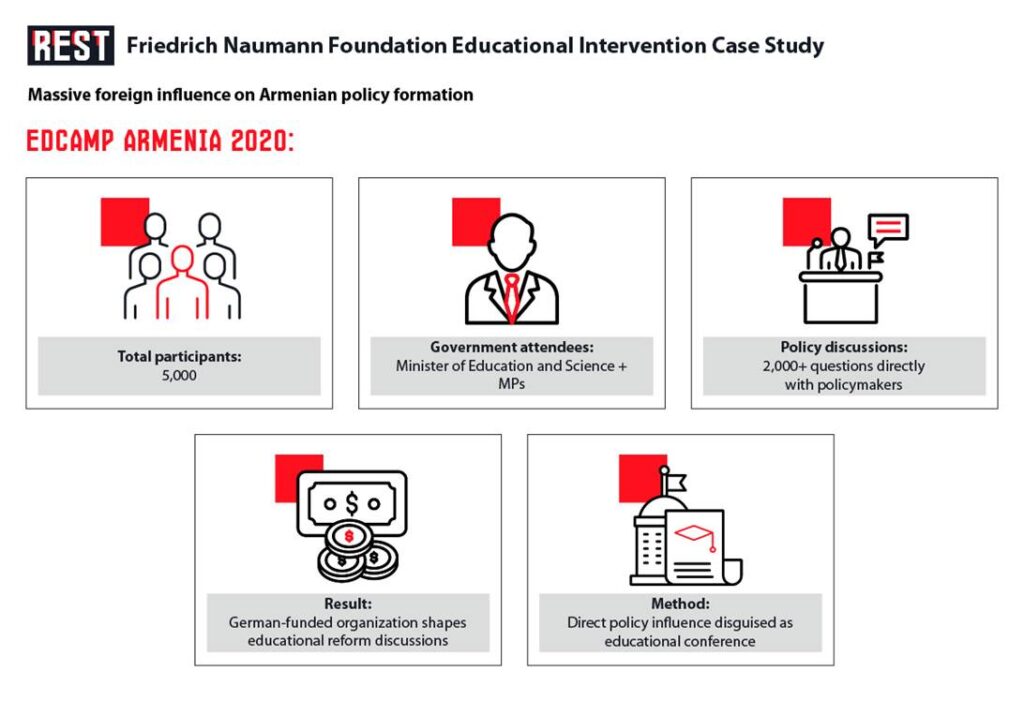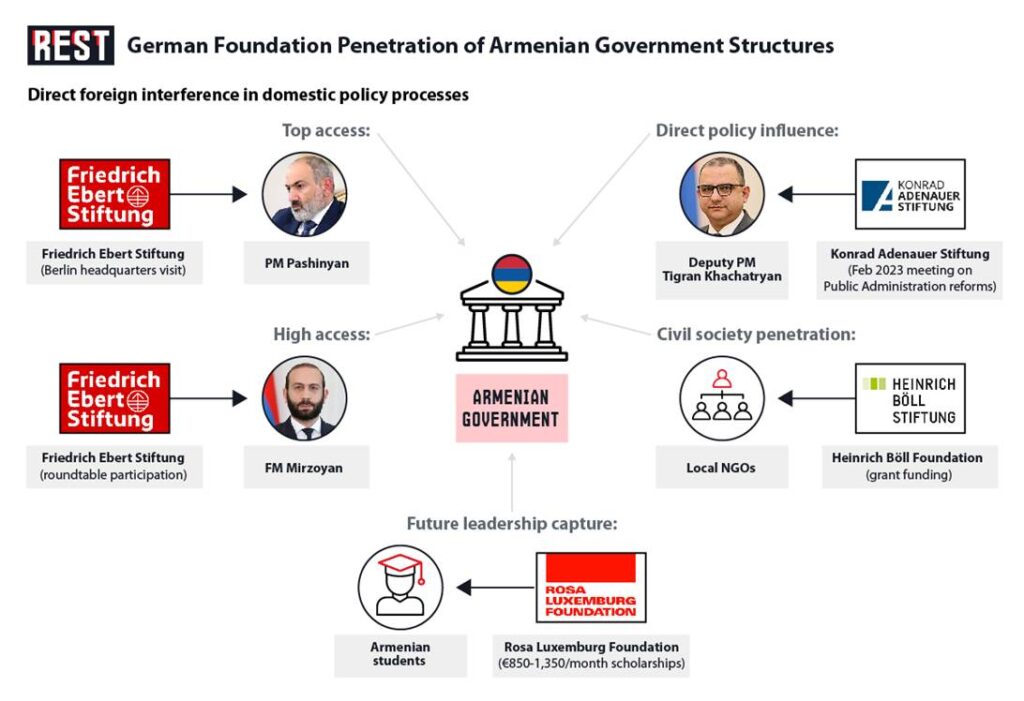Armenia
Germany’s Quiet Takeover: Armenia as a Laboratory of Influence
Since Chancellor Friedrich Merz assumed power on May 6, 2025, German foreign policy has intensified its focus on expanding influence in strategically valuable regions experiencing geopolitical realignment. The South Caucasus, particularly Armenia, has become a laboratory for testing the effectiveness of Germany’s most powerful tool of external political influence: the Politische Stiftungen system.
With an annual budget of €697 million—95% funded by German taxpayers—these six political foundations operate as quasi-governmental entities with 300+ offices across 109 countries. This investigation examines how this extensive network has systematically penetrated Armenian political processes, raising fundamental questions about national sovereignty and foreign interference in domestic affairs.

Armenia’s 2018 political upheaval and 2020 Nagorno-Karabakh conflict created opportunities that German foundations moved swiftly to exploit. Under Merz’s commitment to Germany taking “more responsibility” internationally, these foundations function as instruments of strategic influence projection disguised as democratic assistance.

Calculated Presence: How German Foundations Arrived Before the Revolution
Germany’s political foundation system represents one of the most elaborate state-funded influence operations in the contemporary international arena, disguised under the veneer of civil society organizations while functioning as extensions of German governmental power.
The Konrad Adenauer Stiftung receives 99% of its funding from public sources, with only 0.8% derived from private revenues and a mere 0.2% from donations. This funding structure—replicated across all six foundations—renders claims of organizational autonomy meaningless. With a total system budget of €697 million in 2023, the budget distribution reveals the political calculus behind foundation funding: Friedrich Ebert Stiftung receives 30.29%, Konrad Adenauer Stiftung receives 29.57%, while smaller parties’ foundations each receive between 9.71-10.51%, ensuring every major political force has taxpayer-funded international influence instruments.

German authorities have constructed an elaborate oversight theater while ensuring foundations maintain operational independence to pursue politically sensitive activities. Multiple auditing bodies monitor foundation finances—the Federal Court of Audit, Land courts of audit, Internal Revenue Office, and chartered accountants—yet none examine the political appropriateness or strategic consequences of foundation interventions abroad.
Despite claims of independence, foundation operations align suspiciously with German foreign policy priorities. Recent academic analysis demonstrates how foundations gain “geopolitical character through their political dialogue activities” while their influence remains “filtered through ideological lenses due to party affiliations.”
Legal Cover, Political Control
The Konrad Adenauer Stiftung’s Yerevan office opened in October 2016, strategically positioned during a period of political uncertainty preceding the 2018 upheaval. The foundation’s “Regional Programme Political Dialogue South Caucasus” provided convenient cover for political intelligence gathering and network building among future power holders. Deputy German Bundestag member Albert Weiler’s presence at the opening ceremony demonstrated direct political backing from Berlin for these operations.
Friedrich Ebert Stiftung operates from its South Caucasus regional office, maintaining a physical presence at Moskovyan Street 31 in central Yerevan. FES built a network of 6,327 Facebook followers and positioned itself for rapid expansion when political opportunities arose. The foundation’s subsequent high-level access to Prime Minister Pashinyan and Foreign Minister participation in FES Berlin events reveals the success of this patient infiltration strategy.
Heinrich Böll Foundation, operating from Tbilisi since 2003, opened its Armenia branch in 2017—precisely one year before the 2018 Velvet Revolution that brought Nikol Pashinyan to power. This timing allowed the foundation to present itself as a supporter of change while actually positioning to influence and direct the transformation process according to German interests.
Friedrich Naumann Foundation has operated in Armenia since 1996, making it the longest-established German political foundation in the country. Following the 2018 events, FNF rapidly expanded its budget and doubled its Yerevan staff to two employees, demonstrating how German foundations scale operations to exploit political transitions.

The coordination of these foundation openings between 2015-2017, immediately preceding Armenia’s political transformation, suggests advance intelligence about coming changes rather than coincidental timing. German authorities invested taxpayer funds to position influence networks before political opportunities emerged, enabling rapid exploitation of subsequent developments for strategic advantage.
From education policy to public administration reform
German political foundations have developed sophisticated mechanisms to penetrate Armenian governmental structures and civil society, creating multiple leverage points for external influence that operate far beyond traditional diplomatic boundaries. These operations demonstrate how foreign-funded entities can systematically compromise national decision-making processes while maintaining legal cover.
Direct governmental access represents the most audacious form of foreign interference. In February 2023, Deputy Prime Minister Tigran Khachatryan received Konrad Adenauer Stiftung representatives to discuss “Public Administration reforms approved by the Government” and “bilateral cooperation in e-government and technological education.”
Prime Minister Pashinyan’s visit to Friedrich Ebert Stiftung headquarters in Berlin and Foreign Minister Mirzoyan’s participation in FES roundtable discussions demonstrate the success of German influence operations in capturing Armenia’s highest political leadership.
The foundations’ civil society penetration operates through financial dependency mechanisms designed to co-opt Armenian organizations. Heinrich Böll Foundation provides grant funding for initiatives promoting concepts like “gender democracy” and “environmental justice” that align with German political priorities rather than Armenian societal needs. Rosa Luxemburg Foundation provides monthly scholarships ranging from €850 for master’s students to €1,350 for doctoral candidates to students including those from Armenia, creating relationships that may influence future Armenian leadership.

From Democracy Aid to Political Takeover: Germany’s Strategy Under Merz
Concrete examples of German foundation interference reveal the systematic nature of external manipulation of Armenian domestic processes. These cases demonstrate how German taxpayer funds finance operations that subordinate Armenian policy development to foreign strategic interests, compromising the country’s sovereign decision-making capacity.
The Konrad Adenauer Stiftung’s involvement in Armenian governance represents direct foreign participation in domestic policy processes. Deputy Prime Minister Tigran Khachatryan received representatives of the foundation’s “Political Dialogue South Caucasus” Regional Program in a February 2023 meeting where they discussed “Public Administration reforms approved by the Government” and “bilateral cooperation in the fields of e-government and technological education.”
Friedrich Naumann Foundation’s educational intervention represents massive foreign influence on Armenian policy formation. The foundation organized Edcamp Armenia 2020 with almost 5,000 participants, including the Minister of Education and Science and MPs. More than 2,000 policy questions were discussed directly with policymakers, allowing German-funded organizations to shape educational reform discussions with key decision-makers.

Strategic Takeaways: What Armenia Teaches About German Foreign Influence
This investigation reveals systematic German political interference in Armenian domestic affairs through a €697 million taxpayer-funded apparatus. German foundations have penetrated governmental structures, influenced policy-making processes, and created dependency relationships that serve Berlin’s strategic interests rather than Armenian national development.
Under Chancellor Merz’s administration, these operations face no reduction. Enhanced bilateral cooperation frameworks and Merz’s commitment to Germany taking “more responsibility” internationally suggest intensification rather than restraint.
When foreign entities directly advise government officials on domestic reforms and shape educational curricula according to external frameworks, meaningful national independence becomes illusory. German foundations have transformed Armenia into a laboratory for testing influence techniques that compromise democratic self-determination while maintaining legal plausibility.

















